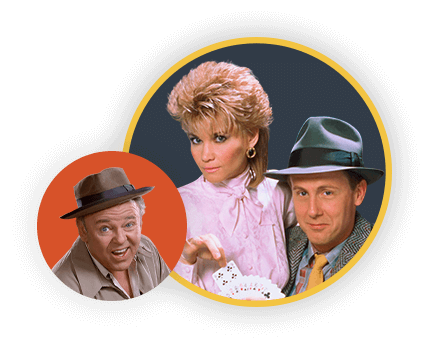12 frothy facts about 'Cheers'

"You want to go where everybody knows your name." This is certainly true of actors. For 11 seasons, the cast of Cheers certainly became household names. The sitcom spent eight of those seasons in the Nielsen top ten. Millions tuned in to follow the romance of Sam and Diane — or the insults from sharp-tongued Carla. We all shouted "Norm!" when George Wendt entered the scene. Beloved characters came and went. Woody replaced Coach. Frasier earned a spin-off. And a staggering 111 Emmy nominations were earned.
Here are a dozen little known facts — as Cliff would say — on which to nibble.

The creators considered setting the bar in a small town or a desert.
Co-creator Les Charles, who had previous produced Taxi, recalled in an oral history with GQ: "We talked about putting this bar out in the desert somewhere, or in a small town, but once we were looking at a city, we immediately went to Boston." Image how different the series would have been in a desert oasis? Actually, it might have been closer to M*A*S*H.

It was one of the earliest sitcoms to feature serialized storytelling.
The narrative practice is so commonplace today that we almost forget, but sitcoms were once one-and-done stories. Sure, there might have been a two-parter here and there, but Cheers popularized the notion of a sitcom with long story arcs, season-long plots and cliffhangers. Les Charles noted, "[W]e may have been partly responsible for what's going on now, where if you miss the first episode or two, you are lost. … I feel kind of badly about it."

Nicholas Colasanto scribbled his lines into the set.
Colasanto wrote down some of his dialogue around the bar so as not to forget his lines. For the episode "Coach Buries a Grudge," he wrote one of his lines — "It's as if he's still with us now" — on the wood to the right of the front door. After Colasanto's death, actors would ritually slap the spot when entering the set, like football players entering a hallowed stadium.

The show performed horribly in the ratings at first.
The sitcom almost failed to make it past the first season. The benevolence and faith of NBC exec Brandon Tartikoff kept it going. Cheers finished near the bottom of the list of 77 network series that season. To help boost ratings, NBC produced a Cheers skit to air with the Super Bowl. Reruns in the summer of 1983 performed much better, perhaps bolstering the hope in both the boardroom and the writers' room.

Shelley Long and Rhea Perlman were pregnant at the same time — though only one showed it on screen.
Both performers gave birth to children in March of 1985. Perlman's pregnancy was written into season three of the show, as you can see in the image. On the other hand, writers kept Long's pregnancy out of the plot, which is why you will find her sitting behind desks and standing behind the bar quite often that season.

Norm's real first name was Hilary.
Hilary R. Peterson was named after his grandfather, who "once killed a man for laughing at him," or so we learn in season nine. Supposedly, the R. stands for Resourceful.

George Wendt's actual wife played Norm's wife.
Norm's wife, Vera, is heard, not seen, in a handful of episodes. Wendt's real-life spouse, Bernadette Birkett, provided the voice of Vera. Birkett did get to show her face on screen in one episode, however — under a mask. She played Tinkerbell in season three's "Fairy Tales Can Come True."

John Ratzenberger originally auditioned for the role of Norm.
How different might that have been? After missing out on the part, Ratzenberger reportedly came up with the character of Cliff himself, successfully suggesting that the bar needed a know-it-all. Speaking of casting What Ifs…

John Lithgow, Janis Ian, Fred Dryer and Ed O’Neill also auditioned for big roles.
Can you picture Hunter as Sam? Or how about folk singer Janis Ian as the cantankerous Carla Tortelli? Or, say, John Lithgow as Frasier? Actually, that last one would have worked. Former football star Dryer was close to landing the role of jock bartender Sam. He did end up on screen as sportscaster Dave Richards in a handful of episodes. Future Married with Children star O'Neill also tried out for Ted Danson's role. David Alan Grier was also near to nabbing a spot in the cast as a never-seen character, but, alas, that never materialized.

Lucille Ball almost played Diane's mom.
Writer-producer Ken Levine told of how the comedy icon almost became part of the cast. "We heard the first year that Lucille Ball loved Cheers, and we all thought she should play Diane's mom. We thought that would really boost the show," Levine explained. Ball met with co-creators Les and Glen Charles. However, the television legend eventually backed out of the role, sensing that I Love Lucy lovers would find the new character too drastic a leap from her established onscreen persona.

Kirstie Alley brought Prince to the set.
The Purple One was a fan of the show. "One time, I brought Prince to the set. He's a friend of mine, and he asked to come," Alley said.

The theme song lyrics originally began with a line about the Red Sox.
As a songwriter, you want to write a song where everybody knows your lyrics. Songwriter Gary Portnoy certainly achieved that with his immortal opening theme to Cheers. "Making your way in the world today takes everything you got," the tune began. In demo form, however, the ditty opened with a line about Boston sports. "Singing the blues when the Red Sox lose, it's a crisis in your life," Portnoy crooned. Perhaps it was changed so as not to offend Yankees fans.

Watch Cheers on Decades
Weeknights at 11P ET | 8P PT




